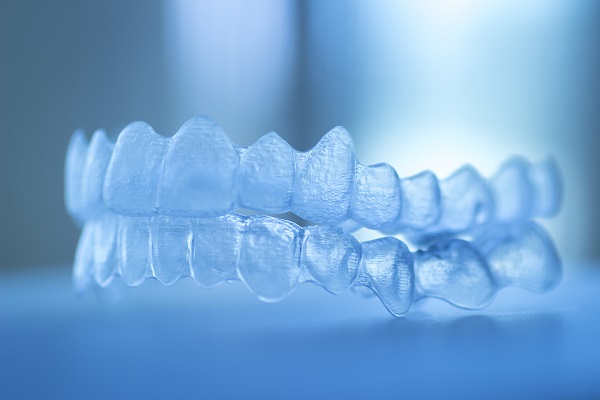Can a Person Wear Invisalign Aligners if They Have Crowned Teeth?

The Invisalign® system is designed to help people with crooked teeth, overbites and gapped teeth correct these issues with a series of removable aligners that work over time. While this treatment can help individuals from all walks of life correct misaligned teeth, there are some factors that may affect how they work. For example, the presence of previous dental work, such as crowns, can impact fit and function, so it is important to talk to a dentist before using these dental aligners.
How does Invisalign® work?
This system is custom-designed to the needs of those who want to repair their smile and realign crooked teeth. Dentists begin with evaluating the patient’s needs, the current state of the teeth and the type of results the candidate is looking for. Once the initial study is complete, molds of the mouth are made and a set of clear plastic aligners are constructed, each one designed to move the teeth into the desired position. The process can take up to eighteen months. Patients with previous dental work may want to ask their dentist how any existing permanent crowns can affect treatment.
Can patients with crowns use this system?
Individuals with pre-existing dental crowns may be surprised to know that the alignment system can be used, even if multiple crowns are present. There are a few factors, however, that may affect the way the aligners work with crowned teeth:
- Tooth composite effectiveness
- The number of crowns
- The location of the crowns
When dental crowns are present in people who want to use teeth aligners, dentists will usually evaluate the mouth carefully to gauge the degree to which they might affect treatment.
How do dentists overcome these issues?
While dentists can encounter problems applying this system to patients who have crowns, there a few ways to resolve them. For example, invisible attachments can be used on crowned teeth to protect the dental work and prevent it from becoming damaged when the aligners begin to move the teeth. Additional sealant may be applied to older crowns to ensure they do not come loose once the aligners are in use.
Can crowns prevent usage entirely?
Most dentists can find ways for patients to use the alignment system; however, not everyone may be a viable candidate. If considerable dental work has already taken place in some individuals, the aligners may not be as effective. An extensive oral exam, which may include identifying the presence of cavities and malfunctioning crowns, can help dental professionals determine the viability of those who want to use the aligners. A set of X-rays may be ordered during the exam as well, as this can help dentists create a comprehensive oral profile before the alignment set is ordered.
Conclusion
Invisalign® teeth aligners can repair a variety of dental issues, from crooked teeth to overbites and tooth gaps. Since previous dental work, such as crowns, can affect how the alignment system works, you may want to speak to a dentist about whether you are a good candidate for its use.
Are you considering Invisalign® in the Forest Hills area? Get more information at https://metrosmiles.com.
Check out what others are saying about our services on Yelp: Read our Yelp reviews.
Recent Posts
Dental restorations have been used for thousands of years. In fact, a 2012 article published by The New York Times details the discovery of a 6,500-year-old human jawbone. Considered the earliest evidence of dental fillings, it had beeswax in one tooth, which researchers believe was to ease the pain of a crack. These days, restorations…
Dental anxiety affects millions of people in the U.S. This anxiety can often prevent patients from getting treatments that can keep oral diseases like tooth decay and gum disease away or prevents them from getting worse. Dental phobias can be the result of previous bad experiences with dentists, or they can be caused by a…
Crowns are commonly used in dental restorations. A crown is a cap shaped like a tooth but hollow in the middle. It fits over a natural tooth that has to be prepared first. Depending on the issue it is correcting, a crown can be used by itself or as a component of another restoration technique.Teeth…
Dental restorations are used to repair or strengthen damaged teeth and to replace missing teeth. The damage may be the result of routine decay, extensive decay, fractures, weak gums, and many other dental issues. Dentists recommend restorations based on the tooth, its location, the source of trouble, the health of surrounding teeth, tooth color, patient…


